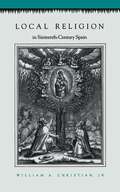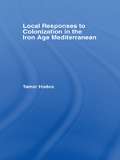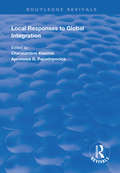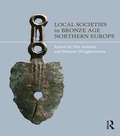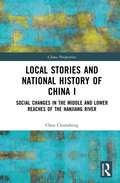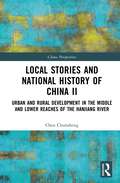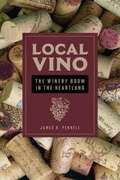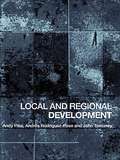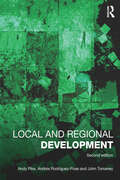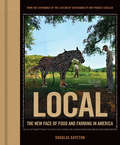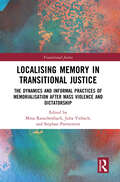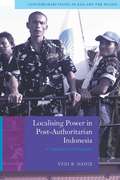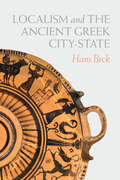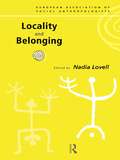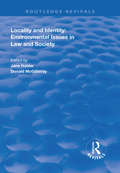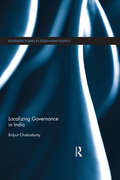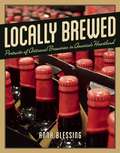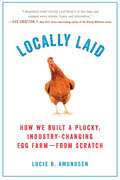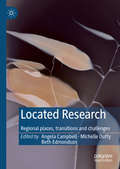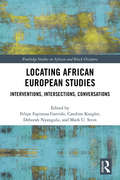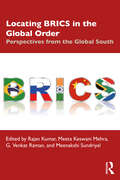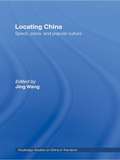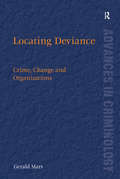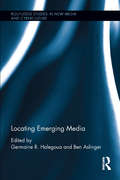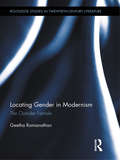- Table View
- List View
Local Religion in Sixteenth-Century Spain
by William A. ChristianThe description for this book, Local Religion in Sixteenth-Century Spain, will be forthcoming.
Local Responses to Colonization in the Iron Age Meditarranean
by Tamar HodosFrom North Syria to Sicily and North Africa, this is the first study to bring together such a breadth of data, and compares responses to colonization in the Iron-Age Mediterranean.
Local Responses to Global Integration: Exploring The Socioeconomic Aspects Of Rural Restructuring (Routledge Revivals)
by Apostolos G. Papadopoulos Charalambos KasimisFirst published in 1999, this volume features articles from 19 contributors on local responses to global integration, with a focus on rural areas and their adoption of new functions as both producers and consumers. It responds to a crisis in the regulatory framework and reconsiders globality, revealing new forms of production and consumption developing in diverse ways amongst these global rural communities. Authors from Australia, Bulgaria, Finland, Greece, Ireland, the Netherlands, Poland, Sweden, the United Kingdom and Venezuela are represented.
Local Societies in Bronze Age Northern Europe
by Nils Anfinset Melanie WrigglesworthThis book aims to understand the process of the Bronze Age societies of Northern Europe which are often regarded as the periphery and a bleak contrast to the Central European Bronze Age. The Bronze Age is the first "globalised" period with new types of societies and new modes of exchange and trade. In this context there is considerable local variation and diversity within the Bronze Age societies of Northern Europe which is poorly understood, although there have been advances and changes in this research. Therefore this book challenges some of the mainstream opinions on the Bronze Age of Northern Europe, and focus on local and regional aspects. This is done by a series of articles from significant contributors that deal with these issues on theoretical and empirical levels, with regards to differences, cultural dualism, boundaries, regions and regionality in a period of increased "globalisation". The result is a movement away from local and regional aspects toward communications, travels and contacts between northern Europe and the greater world, not only towards Central Europe and the Near East but also towards the east. Northern/Arctic Europe is often left out in these discussions, and this book will contribute to this greater picture of the Bronze Age world.
Local Stories and National History of China I: Social Changes in the Middle and Lower Reaches of the Hanjiang River (China Perspectives)
by Chen ChunshengThis book is the first of a two-volume set examining the social history of the Hanjiang River region of southern China. It studies the complex social fabric of the region from the Song Dynasty to the early Qing Dynasty, focusing on religious practices, ethnic relations, and social change.The first part presents the region’s geography and history, and sets out the methods for studying its social history. The second part of this book is about the formation of social order between the Song and mid-Ming dynasties. It explores religious beliefs, coastal defense systems, and the governance of ethnic groups. The final part analyzes the relationship between “bandits” and “people” in the mid-Ming and early Qing periods, using local literature, religious practices, and settlement patterns. This analysis reveals how rural militarization and dynastic influence shaped territorial society in the late Ming and early Qing.This title is an essential resource for scholars and students of pre-modern Chinese social history, historical anthropology, religious studies, maritime history, and ethnic relations.
Local Stories and National History of China II: Urban and Rural Development in the Middle and Lower Reaches of the Hanjiang River (China Perspectives)
by Chen ChunshengThis book is the second in a two-volume set examining the social history of the Hanjiang River region in southern China from the Song Dynasty to the modern era. It explores how clan structures, temple networks, and overseas Chinese communities shaped the region’s development.The volume first analyzes the evolution of social power structures during the Qing Dynasty, showing how state systems influenced local development through clan organization and maritime trade networks. It then looks at how Shantou grew as an important city, and how Chinese charities, beliefs, and networks around the South China Sea grew too. The text documents the region’s transformation into a distinctive “hometown” society, defined by its overseas connections and evolving cultural identities.This volume is an essential resource for scholars and students of pre-modern and modern Chinese social history, historical anthropology, China’s modern trade networks, overseas communities, and diaspora studies.
Local Vino: The Winery Boom in the Heartland
by James R PennellThe art and craft of winemaking has put down roots in Middle America, where enterprising vintners coax reds and whites from the prairie earth while their businesses stand at the hub of a new tradition of community and conviviality. James R. Pennell tracks among the hardy vines and heartland terroir of wineries across Illinois, Iowa, Indiana, and Ohio. Blending history and observation, Pennell gives us a ground-up view of the business from cuttings and cultivation to sales and marketing. He also invites entrepreneurs to share stories of their ambitions, hard work, and strategies. Together, author and subjects trace the hows and whys of progress toward that noblest of goals: a great vintage that puts their winery on the map.
Local and Regional Development
by Andy Pike Andrés Rodriguez-Pose John Tomaney Andres Rodriguez-PoseLocal and regional development is an increasingly global issue. For localities and regions, the challenge of enhancing prosperity, improving wellbeing and increasing living standards has become acute for localities and regions formerly considered discrete parts of the ‘developed’ and ‘developing’ worlds. Amid concern over the definitions and sustainability of ‘development’, a spectre has emerged of deepened unevenness and sharpened inequalities in the development prospects for particular social groups and territories. Local and Regional Development engages and addresses the key questions: what are the principles and values that shape definitions and strategies of local and regional development? What are the conceptual and theoretical frameworks capable of understanding and interpreting local and regional development? What are the main policy interventions and instruments? How do localities and regions attempt to effect development in practice? What kinds of local and regional development should we be pursuing? This book addresses the fundamental issues of ‘what kind of local and regional development and for whom?’, frameworks of understanding, and instruments and policies. It outlines what a holistic, progressive and sustainable local and regional development might constitute before reflecting on its limits and political renewal. With the growing international importance of local and regional development, this book is an essential student purchase, illustrated throughout with maps, figures and case studies from Asia, Europe, and Central and North America.
Local and Regional Development
by Andy Pike Andrés Rodriguez-Pose John TomaneyActors and institutions in localities and regions across the world are seeking prosperity and well-being amidst tumultuous and disruptive shifts and transitions generated by: an increasingly globalised, knowledge-intensive capitalism; global financial instability, volatility and crisis; concerns about economic, social and ecological sustainability, climate change and resource shortages; new multi-actor and multi-level systems of government and governance and a re-ordering of the international political economy; state austerity and retrenchment; and, new and reformed approaches to intervention, policy and institutions for local and regional development. Local and Regional Development provides an accessible, critical and integrated examination of local and regional development theory, institutions and policy in this changing context. Amidst its rising importance, the book addresses the fundamental issues of ‘what kind of local and regional development and for whom?’, its purposes, principles and values, frameworks of understanding, approaches and interventions, and integrated approaches to local and regional development throughout the world. The approach provides a theoretically informed, critical analysis of contemporary local and regional development in an international and multi-disciplinary context, grounded in concrete empirical analysis from experiences in the global North and South. It concludes by identifying what might constitute holistic, inclusive, progressive and sustainable local and regional development, and reflecting upon its limits and political renewal.
Local: The New Face of Food and Farming in America
by Douglas GayetonCombining stunning visuals with insights and a lexicon of more than 200 agricultural terms explained by today’s thought leaders, Local showcases and explores one of the most popular environmental trends: rebuilding local food movements.When Douglas Gayeton took his young daughter to see the salmon run—a favorite pastime growing up in Northern California—he was devastated to find that a combination of urban sprawl, land mismanagement, and pollution had decimated the fish population.The discovery set Gayeton on a journey in search of sustainable solutions. He traveled the country, photographing and learning the new language of sustainability from today’s foremost practitioners in food and farming, including Alice Waters, Wes Jackson, Carl Safina, Temple Grandin, Paul Stamets, Patrick Holden, Barton Seaver, Vandana Shiva, Dr. Elaine Ingham, and Joel Salatin, as well as everyday farmers, fishermen, and dairy producers.Local: The New Face of Food and Farming blends their insights with stunning collage-like information artworks and Gayeton’s Lexicon of Sustainability, which defines and de-mystifies hundreds of terms like “food miles,” “locavore,” “organic,” “grassfed” and “antibiotic free.” In doing so, Gayeton helps people understand what they mean for their lives. He also includes “eco tips” and other information on how the sustainable movement affects us all every day.Local: The New Face of Food and Farming in America educates, engages, and inspires people to pay closer attention to how they eat, what they buy, and where their responsibility begins for creating a healthier, safer food system in America.
Localising Memory in Transitional Justice: The Dynamics and Informal Practices of Memorialisation after Mass Violence and Dictatorship
by Mina Rauschenbach, Julia Viebach, and Stephan ParmentierThis collection adds to the critical transitional justice scholarship that calls for “transitional justice from below” and that makes visible the complex and oftentimes troubled entanglements between justice endeavours, locality, and memory-making. Broadening this perspective, it explores informal memory practices across various contexts with a focus on their individual and collective dynamics and their intersections, reaching also beyond a conceptualisation of memory as mere symbolic reparation and politics of memory. It seeks to highlight the hidden, unwritten, and multifaceted in today’s memory boom by focusing on the memorialisation practices of communities, activists, families, and survivors. Organising its analytical focal point around the localisation of memory, it offers valuable and new insights on how and under what conditions localised memory practices may contribute to recognition and social transformation, as well as how they may at best be inclusive, or exclusive, of dynamic and diverse memories. Drawing on inter- and multi-disciplinary approaches, this book brings an in-depth and nuanced understanding of local memory practices and the dynamics attached to these in transitional justice contexts. It will be of much interest to students and scholars of memory and genocide studies, peace and conflict studies, transitional justice, sociology, and anthropology.
Localising Power in Post-Authoritarian Indonesia
by Vedi HadizThis book is about how the design of institutional change results in unintended consequences. Many post-authoritarian societies have adopted decentralization-effectively localizing power-as part and parcel of democratization, but also in their efforts to entrench "good governance. " Vedi Hadiz shifts the attention to the accompanying tensions and contradictions that define the terms under which the localization of power actually takes place. In the process, he develops a compelling analysis that ties social and institutional change to the outcomes of social conflict in local arenas of power. Using the case of Indonesia, and comparing it with Thailand and the Philippines, Hadiz seeks to understand the seeming puzzle of how local predatory systems of power remain resilient in the face of international and domestic pressures. Forcefully persuasive and characteristically passionate, Hadiz challenges readers while arguing convincingly that local power and politics still matter greatly in our globalized world.
Localism and the Ancient Greek City-State
by Hans BeckA Greek historian investigates the importance of local identity in the Mediterranean world in a “rare, genuinely original book . . . Highly recommended” (Choice).Much as our modern world is interconnected through global networks, the ancient Greek city-states were a dynamic part of the wider Mediterranean landscape. In Localism and the Ancient Greek World, historian Hans Beck argues that local shifts in politics, religion and culture had a pervasive influence in a world of fast-paced change.Citizens in these communities were deeply concerned with maintaining local identity, commercial freedom, distinct religious cults, and much more. Beyond these cultural identifiers, there lay a deeper concept of the local that guided polis societies in their contact with a rapidly expanding world.Drawing on a staggering range of materials—including texts by both known and obscure writers, numismatics, pottery analysis, and archeological records—Beck develops fine-grained case studies that illustrate the significance of the local experience. Localism and the Ancient Greek City-State builds bridges across disciplines and ideas within the humanities. It highlights the importance of localism not only in the archaeology of the ancient Mediterranean, but also in today’s conversations about globalism, networks, and migration.
Locality and Belonging (European Association of Social Anthropologists)
by Nadia LovellLocality and Belonging provides an international overview of the close relationship between territory and cultural identity. The issue of 'belonging' has long been recognized as crucial to the study of identity within anthropology. Here, contributors from Sweden, Norway, the Netherlands, France and the UK present rigorous case studies of 'belonging' from the UK, South Africa, Argentina, Zanzibar, Amazonia, Indonesia and West Africa. Among the themes explored are:* space, memory and ethnicity* the mnemonic use of objects* mythologies of football and history* use of 'natural features' of the environment* nationhood and post-colonial identity making.
Locality and Identity: Environmental Issues in Law and Society (Routledge Revivals)
by Jane Holder Donald McGillivrayFirst published in 1999, this volume is concerned with how issues of identity and locality – globalization and ethics, valuing the environment, environmental justice and the use of traditional and new legal forms – cross the disciplines of law, ethics, geography, political science and social theory. Necessarily diverse, the collection both explores and confronts the limitations of law that prevent recognition of the relationship between humans and nature.
Localizing Governance in India (Routledge Studies in South Asian Politics)
by Bidyut ChakrabartyParticipatory governance has a long history in India and this book traces historical-intellectual trajectories of participatory governance and how older Western discourses have influenced Indian policymakers. While colonial rulers devolved power to accommodate dissenting voices, for independent India, participatory governance was a design for democratizing governance in its true sense. Participation also acted as a vehicle for localizing governance. The author draws on both Western and non-Western theoretical treatises and the book seeks to conceptualize localizing governance also as a contextual response. It also makes the argument that despite being located in different socio-economic and political milieu, thinkers converge to appreciate localizing governance as perhaps the only reliable means to democratize governance. The book aims to confirm this argument by reference to sets of evidence from the Indian experience of localizing governance. By attempting a genealogy of participatory governance in the West and in India, and an empirical study of participatory governance in India, the book sheds light on the exchange of ideas and concepts through space and time, thus adding to the growing body of literature in the social sciences on ‘conceptual flow’. It will be of interest to political scientists and historians, in particularly those studying South Asia.
Locally Brewed
by Anna BlessingLocally Brewed celebrates the Midwest's craft brewing movement with profiles of 20 of the area's brewmasters and their breweries. These are entertaining and inspiring stories of the individuals who have been essential in the exponential growth of this movement, as told through vivid interviews, beautiful photography, and dynamic artwork.In just the past 20 years, beer has been transformed from a "low-class" drink to a pluralistic, populist drink with the same stylistic diversity and caring craftsmanship as wine. One of the strongest hotbeds of this cultural shift is in the Midwest, where independently owned craft brewers focus on the creative, artisanal elements of the beer-making process. Locally Brewed explores these trends and the fun, fascinating, and unique details of each brewery, including label art, hand-pull designs, and of course the brews themselves.This is a book that can be enjoyed by the "beer geek" and the casual imbiber alike, as it emphasizes the people behind the beer as well as the beers they brew. Special sidebars and pullouts show what makes each brewery special, weaving together the story of the indie beer movement, relevant to both small-town Midwesterners and big-city beer lovers.
Locally Laid: How We Built a Plucky, Industry-changing Egg Farm - from Scratch
by Lucie B. AmundsenHow a Midwestern family with no agriculture experience went from a few backyard chickens to a full-fledged farm--and discovered why local chicks are better.When Lucie Amundsen had a rare night out with her husband, she never imagined what he'd tell her over dinner--that his dream was to quit his office job (with benefits!) and start a commercial-scale pasture-raised egg farm. His entire agricultural experience consisted of raising five backyard hens, none of whom had yet laid a single egg. To create this pastured poultry ranch, the couple scrambles to acquire nearly two thousand chickens--all named Lola. These hens, purchased commercially, arrive bereft of basic chicken-y instincts, such as the evening urge to roost. The newbie farmers also deal with their own shortcomings, making for a failed inspection and intense struggles to keep livestock alive (much less laying) during a brutal winter. But with a heavy dose of humor, they learn to negotiate the highly stressed no-man's-land known as Middle Agriculture. Amundsen sees firsthand how these midsized farms, situated between small-scale operations and mammoth factory farms, are vital to rebuilding America's local food system. With an unexpected passion for this dubious enterprise, Amundsen shares a messy, wry, and entirely educational story of the unforeseen payoffs (and frequent pitfalls) of one couple's ag adventure--and many, many hours spent wrangling chickens.
Located Research: Regional places, transitions and challenges
by Angela Campbell Beth Edmondson Michelle DuffyThis book examines the diversity of practice in regional research and its contribution to local, national and global issues. Three themes are advanced here: Place and change, Transition and resilience, and Challenges for the future. Contributors embrace frameworks of co-design and transdisciplinary practice to build communities of practice in response to lived experience in regional contexts. Their work highlights the strategic importance of a regional focus at a time when global connectivity and mobility is increasing and the complexity of ‘wicked’ problems demands more than one approach or solution. Such complex problems require nuanced, and at times ‘bespoke’ methodological approaches to better understand and support not just regional adaptation, resilience and transformation, but to manage all these things at a time when change is everywhere.
Locating African European Studies: Interventions, Intersections, Conversations (Routledge Studies on African and Black Diaspora)
by Caroline Koegler Felipe Espinoza Garrido Deborah Nyangulu Mark U. SteinDrawing on a rich lineage of anti-discriminatory scholarship, art, and activism, Locating African European Studies engages with contemporary and historical African European formations, positionalities, politics, and cultural productions in Europe. Locating African European Studies reflects on the meanings, objectives, and contours of this field. Twenty-six activists, academics, and artists cover a wide range of topics, engaging with processes of affiliation, discrimination, and resistance. They negotiate the methodological foundations of the field, explore different meanings and politics of ‘African’ and ‘European’, and investigate African European representations in literature, film, photography, art, and other media. In three thematic sections, the book focusses on: African European social and historical formations African European cultural production Decolonial academic practice Locating African European Studies features innovative transdisciplinary research, and will be of interest to students and scholars of various fields, including Black Studies, Critical Whiteness Studies, African American Studies, Diaspora Studies, Postcolonial Studies, African Studies, History, and Social Sciences.
Locating BRICS in the Global Order: Perspectives from the Global South
by Rajan Kumar Meeta Keswani Mehra G. Venkat Raman Meenakshi SundriyalBRICS is conceivably the most formidable organisation to have emerged in the post-Cold War period in the non-Western world. This book highlights the significance of BRICS in a wider global context and foregrounds the long-pending demand for the reform of global governance institutions. The volume: • Traces how the organisation came into being and looks at the distinct norms and principles espoused by it • Discusses the glaring limitations of the existing institutions of global governance • Explores the economic growth and the rising political influence of BRICS states • Analyses the internal threats to the survival of the organisation and assesses its prospects in the foreseeable future. A significant intervention in situating BRICS as one of the major players in global governance, the book will be of great interest to students and scholars of international political economy, international business and finance, international relations, politics, and Global South Studies.
Locating China: Space, Place, and Popular Culture (Routledge Studies on China in Transition #2)
by Jing WangTaking a multidisciplinary approach, this volume examines the relationship between space and the production of local popular culture in contemporary China. The international team of contributors examine the inter-relationship between the cultural imaginary of a given place and China’s continuing drive towards urbanization. This has led to the development of new spaces and places, and new forms of spatial practices that destabilize old concepts of the ‘local’ and ‘locality’. Delivering ethnographic observations and theoretical speculations, this work furthers our understanding of the link between spatial thinking and the production of consumer culture in China.
Locating Deviance: Crime, Change and Organizations (New Advances in Crime and Social Harm)
by Gerald MarsThis book takes a radical look at organizational crime and deviance through the prism of Cultural Theory derived from anthropology. It does so through case studies and by introducing new concepts such as 'organizational perversion', 'tyranny' and 'organizational capture'. Exploring the effects of change and environmental influences such as globalization, new technologies and trade-cycles on the nature and potency of criminogenic communities such as ports and holiday resorts, the book gives special attention to the justification of ethics and to the analysis of behaviours that have contributed to the current economic downturn. The Appendix offers a practical guide to the ethnographic assessment of links between organizations and varying types of crime and deviancy using a Cultural Theory framework.
Locating Emerging Media (Routledge Studies in New Media and Cyberculture)
by Ben Aslinger Germaine R. HalegouaLocating Emerging Media focuses on the tensions between the local and global in the design, distribution, and use of emerging media forms, building on scholarship on the cultural geography of new media networks and products and the relationships between the "global" and the "local." Authors consider new media practices, texts, services, software, policies, infrastructures, and design discourses that enrich existing relationships between creative industries and cultures of production, reception, and engagement. This consideration highlights the relationships between global and local perspectives and new media technologies and practices emerging within (and through) the geography and culture of particular places. Areas examined include East Asia, Latin America, Africa, Europe, South Asia, the Pacific Islands, and the Middle East. Through all is the recognition that what is new or emergent around the globe is unique in each locality.
Locating Gender in Modernism: The Outsider Female (Routledge Studies in Twentieth-Century Literature)
by Geetha RamanathanThis book visits modernism within a comparative, gendered, and third-world framework, questioning current scholarly categorisations of modernism and reframing our conception of what constitutes modernist aesthetics. It describes the construction of modernist studies and argues that despite a range of interventions which suggest that philosophical and material articulations with the third world shaped modernism, an emphasis on modernist "universals" persists. Ramanathan argues that women and third-world authors have reshaped received notions of the modern and revised orthodox ideas on the modern aesthetic. Authors such as Bessie Head, Josiane Racine, T.Obinkaram Echewa, Raja Rao, Gabriel Garcia Marquez, Sembene Ousmane, Salman Rushdie, Ana Castillo, Attia Hossain, Bapsi Sidhwa, and Sahar Khalifeh, are visited in their specific cultural contexts and use some form of realism, a mode that western modernism relegates to the nineteenth century. A comparative methodology and extensive research on intersecting topics such as post-coloniality and the articulation between gender and modernist aesthetics facilitates readings of the modern in twentieth century literature that fall outside standards of western modernism. Considering the relationship between aesthetics and ideology, Ramanathan lays out a critical apparatus to enhance our understanding of the modern, thus suggesting that form is not universal, but that the history of forms, like the history of colonialism and of women, indicates very specific modalities of the modern.
